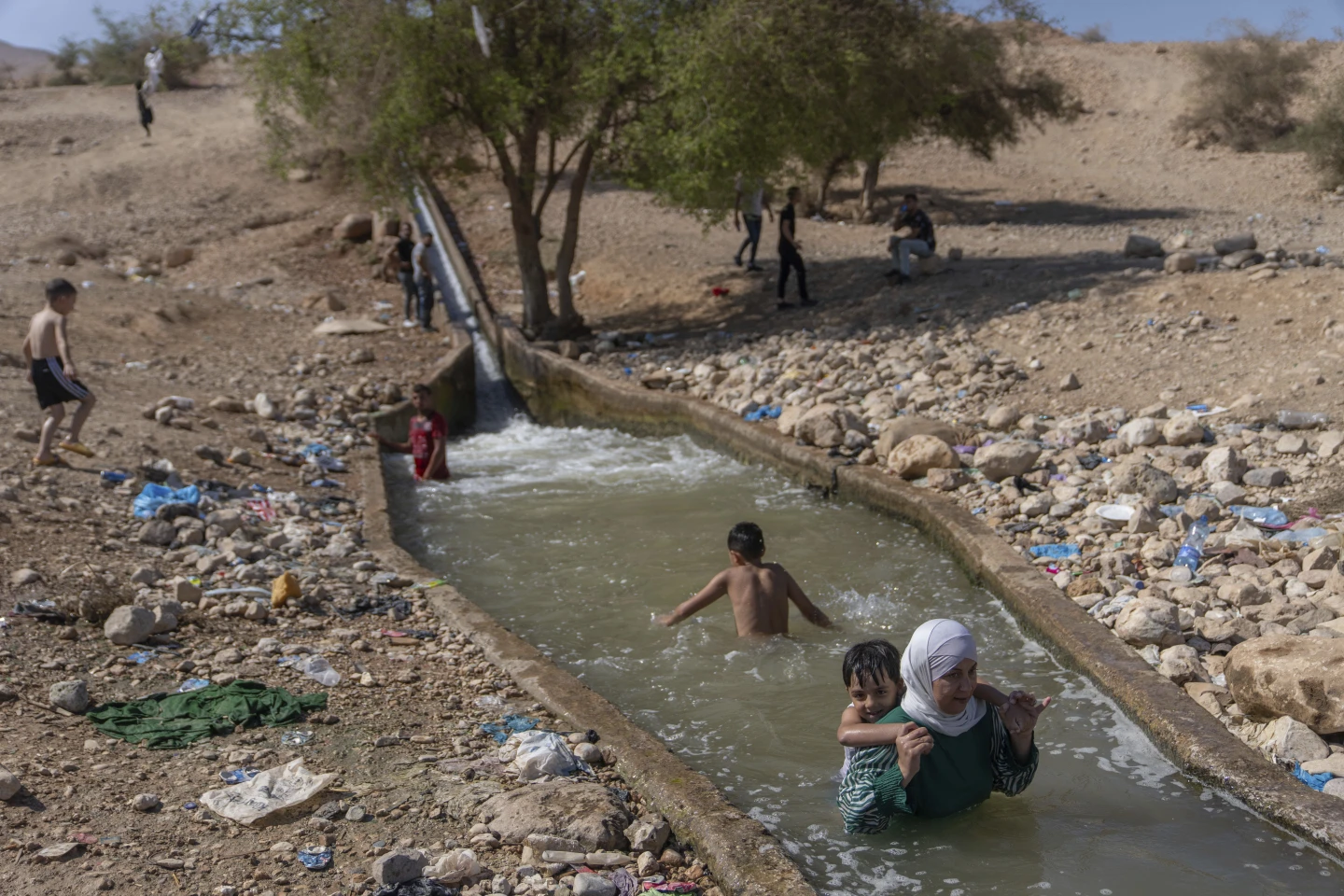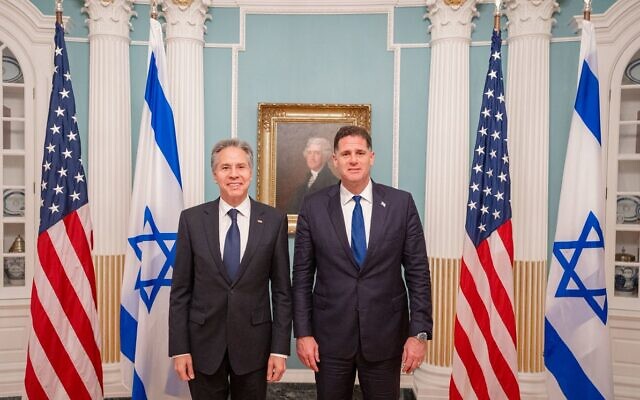 |
|
I’m writing to share J Street’s resources and news updates.
I hope you’ll check out, or continue making use of, our regularly updated dossier on the Netanyahu government. As always, you can find our Congressional briefing book, background information on the Israeli-Palestinian conflict, recordings of previous briefings and more at J Street’s Congressional Resource Page.
Feel free to reach out with any questions.
All the best,
Regev
—
Regev (Rae) Ortal (she/her)
Senior Government Affairs Associate, J Street
mobile: (719) 301-8453 | [email protected]
Find J Street: Website | Facebook | Twitter
|
This week on j street
|
|
|
| ISSUE BRIEF |
|
[Updated] ISRAEL-SAUDI ARABIA NORMALIZATION MUST ADVANCE US & REGIONAL INTERESTS
|
| Read more → |
|
|
|
|
|
What we’re reading
|
Netanyahu’s tension with Israeli security brass boils over amid accusations of dictatorship
|
 |
| The growing tensions between Prime Minister Benjamin Netanyahu and the top military brass have reached a new high… While Netanyahu and a group of hard-line politicians have been framing Israeli security leaders as enemies and traitors, senior officers and hundreds of former leaders of the army, Shin Bet, Mossad, Atomic Energy Commission and other institutions are accusing the government of turning Israel into a dictatorship… The latest incident in this worsening public climate occurred over the weekend, when Israel air force commander Maj. Gen. Tomer Bar met with a group of some 60 reserve pilots who had suspended their service to protest the judicial overhaul …The leaks angered Netanyahu, who lashed out at Bar’s boss, IDF Chief of Staff Lt. Gen. Herzi Halevi…. The prime minister refused to meet Halevi before a crucial Knesset vote on the overhaul, declined to convene the security cabinet and forbade security chiefs from reporting on the overhaul’s damaging implications on operational competence. Following the published comments from Bar’s conversation with the pilots, Netanyahu reportedly threatened to administer polygraph tests to suspected leakers. “It’s a dictatorship in the making,” a former senior military source told Al-Monitor on condition of anonymity. “He is trying to build a North Korea-style media here. He is trying to control everything. It is starting to remind us of the failure of the Yom Kippur War — but then there was a government and there was a cabinet, today there is only one man.” |
| read more |
As Israeli settlements thrive, Palestinian taps run dry. The water crisis reflects a broader battle
|
 |
| Across the dusty villages of the occupied West Bank, where Israeli water pipes don’t reach, date palms have been left to die. Greenhouses are empty and deserted. Palestinians say they can barely get enough water to bathe their children and wash their clothes — let alone sustain livestock and grow fruit trees. In sharp contrast, neighboring Jewish settlements look like an oasis. Wildflowers burst through the soil. Farmed fish swim in neat rows of ponds. Children splash in community pools… With regional droughts intensifying, temperatures rising and Israel’s far-right government entrenching military rule over the territory, Palestinians say their water problems have worsened. “This is the hardest summer we’ve had in nine years,” said Palestinian Water Minister Mazen Ghunaim… In the majority of the West Bank where Israel maintains full civilian and security control, Palestinians cannot dig or deepen wells without hard-to-get permits. Since 2021, Israeli authorities have demolished nearly 160 unauthorized Palestinian reservoirs, sewage networks and wells across the West Bank and east Jerusalem, according to the United Nations humanitarian agency, OCHA… “The main motivation for Israeli actions are not so much about water anymore but about politics,” said Jan Selby, a political expert on water issues at the University of Sheffield. Israel’s water network is used not only to power settlements — which most of the international community considers illegal — but also to irrigate the abundant vineyards and olive groves of Jewish outposts, which are built without official authorization. By empowering Jewish outposts to cultivate disputed land and export fine wines and soft dates, Israel expands authority over the West Bank, said anti-settlement researcher Dror Etkes. “Agricultural cultivation is a much more effective way to grab land than construction,” he said. |
| read more |
Netanyahu Coalition to Recognize, Fund W. Bank Settlements Lacking Official Status
|
 |
| Israel’s coalition has decided to grant de facto recognition to West Bank settlements lacking official independent status. This decision entails direct funding allocation to these settlements. The move, which has already received approval in principle from the Justice Ministry, is expected to come before the cabinet for approval in the coming weeks as key decision makers finalizing the proposal. The decision will likely include funding amounting to hundreds of millions of shekels for infrastructure, paving roads and education… For example, settlements like Nofei Prat and Alon, which are officially parts of Kfar Adumim and are treated as such by the Central Bureau of Statistics, will receive indepent status and direct funds. The reasoning is that they effectively operate as independent settlements and have their own governing councils. A source familiar with the details added that the move won’t lead to the recognition of illegal outposts. He referred to many outposts that were initially developed as settlement neighborhoods. Recently, the outposts of Palgei Mayim and Hayovel were developed as neighborhoods of the settlement of Eli, and before that Nofei Nehemia, Zayit Ra’anan, Derech Ha’avot and Pnei Kedem as neighborhoods of their adjacent settlements. |
| read more |
Blinken presses Dermer for steps to calm region, as US awaits pledged boost for PA
|
 |
| Strategic Affairs Minister Ron Dermer met in Washington with US Secretary of State Antony Blinken on Thursday, as the Biden administration looks for an update on Israeli pledges to boost the Palestinian Authority that have yet to be actualized. On July 9, Prime Minister Benjamin Netanyahu’s cabinet passed a decision to work to bolster the PA and keep Ramallah from the looming threat of both financial and political collapse. However, the cabinet vote was largely symbolic and did not include any concrete steps. Even nominal steps Netanyahu’s office pledged in the spring have yet to be fully implemented, further sparking Washington’s ire. According to a State Department readout of the Thursday meeting, Blinken emphasized to Dermer “the importance of Israel and the Palestinians taking affirmative steps to de-escalate tensions and bolster stability in the West Bank”… Netanyahu’s office had promised that it would take steps to improve Palestinian livelihood in an effort to assuage Washington after the Defense Ministry advanced plans for thousands of new settlement homes in the West Bank, Dermer told ministers at an August 6 meeting, according to an Israeli source with knowledge of the talks. According to the official, Dermer told the cabinet at the meeting that the delay risks harming Israel’s ties to the Biden administration. Though nothing concrete has been agreed upon, the Israeli source blamed Finance Minister Bezalel Smotrich for the delay, noting his well-known stance against moves that benefit Ramallah and his control of the government’s purse strings… Dermer and Blinken also discussed “ongoing efforts to further Israel’s full integration into the Middle East,” the State Department said, an apparent reference to US efforts to broker a normalization agreement between Israel and Saudi Arabia. |
| read more |
Riyadh Appoints Envoy to Palestinians Amid Push for Saudi-Israeli Ties
|
 |
| Saudi Arabia has appointed its first envoy to the Palestinian administration in the Israeli-occupied West Bank, a move widely seen as linked to efforts led by the United States to forge diplomatic ties between Saudi Arabia and Israel. The Saudi envoy to Jordan, Nayef Al-Sudairi, will now concurrently serve as a “nonresident ambassador to the State of Palestine,” the Saudi Ministry of Foreign Affairs announced on Saturday in a brief statement… The announcement came amid escalating efforts by the United States to establish formal relations for the first time between Israel and Saudi Arabia. It also followed speculation in Israel that Saudi Arabia — which has long opposed enacting formal ties until the Israeli-Palestinian conflict has been resolved — might now be prepared to do so without Israel’s providing the Palestinians with greater autonomy. “It’s sort of a check box,” Prime Minister Benjamin Netanyahu of Israel said in an interview broadcast last week… But Saudi and Palestinian analysts said that the appointment of Ambassador Al-Sudairi showed that Riyadh was serious about securing better treatment for the Palestinians… If a deal is reached in the coming year, it is expected to involve a three-way agreement in which the United States provides Riyadh with greater military support and help for a civil nuclear program, and Israel offers the Palestinians some kind of concession. On Sunday, the Israeli government, which is dominated by lawmakers opposed to Palestinian sovereignty, continued to downplay the relevance of the Palestinian component of the negotiations. Eli Cohen, the Israeli foreign minister, said on Sunday in a radio interview that the announcement was largely symbolic… But Palestinians took heart from the announcement — particularly its assertion that the ambassador would also serve, at least in name, as consul general in Jerusalem. |
| read more |
|